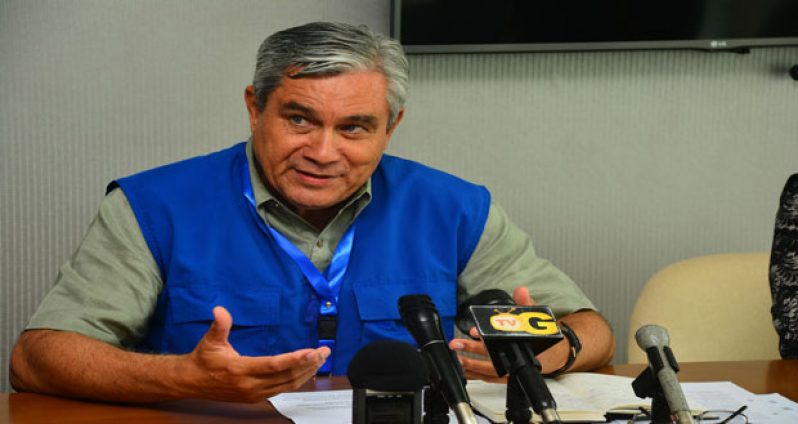THE team of observers fielded by the Union of South American Nations (UNASUR) has commended Guyana’s voting process, saying it was well organised and that the system serves as a best practice for the Region.The UNASUR team based its report on observation up to noon yesterday.
In spite of the well-managed process — which had a few hiccups — the observers say that many persons with physical disability voted, although no special provision was made to get them to polling stations.
That aside, the team noted that easier access to voting would have been facilitated had there been more polling stations; but, they said, this observation does not, in any way suggest that the process was not efficient.
UNASUR’s Chief Representative, Mr Domingo Paredes, said these observations are issues for the Guyana Elections Commission (GECOM) to address in future elections. Notwithstanding, he said, the voting went smoothly, and there was large voter turnout at the 33 centres the UNASUR team monitored.
The UNASUR team monitored voting at 12 polling stations at Parika in Region 3, eight stations at Georgetown in Region 4, eight at New Amsterdam in Region 6, and five at Linden in Region 10. The team began work at 05:00 hours; and, according to Paredes, all the centres were opened on time, compared to other countries in which long delays had been witnessed.
“Congratulations, Guyana!” he said, and added: “We have seen information centres at all the polling stations we have visited.”
All the polling stations had security personnel, and there were visual aids for voters.
The UNASUR Chief Mission Representative said that although there were long lines, queuing was very organized, and people waited patiently to vote. This, he said, is quite unlike what obtains in other countries, where voters become impatient and scream and demand to vote.
LARGE TURNOUT
Mr Paredes also congratulated the electorate for turning out in their numbers to vote. He estimated that, at about 10:00 hours, between 35 per cent and 40 per cent of voters had already voted.
“We observed tranquility and peace, citizens waiting responsibly in lines to vote… We can say that the process during the morning time was normal,” Paredes told journalists at a media briefing at the Marriott Hotel yesterday.
He also noted that the polling clerks were competent and knowledgeable, and he credited their good work to GECOM. This aspect of the exercise, he said, is an area in which UNASUR has learnt from Guyana.
The UNASUR Chief Observer said that in no country where the team had previously monitored elections has it encountered the presence of political party agents verifying the authenticity of the process. What is even more remarkable for the Guyanese experience was that Lists of Electors were given to those party agents to verify that citizens eligible to vote were on the list. This, Paredes said, happens nowhere else in South America.
“This is why we said to ourselves that we have a lot to learn. Even with limitation in areas, we have a lot to learn from Guyana and (its) electoral process.”
Most importantly, too, he said, the team saw a large female participation in the voting process, although there are apparently not many female candidates in the political parties.
In the morning session, there were several reports of disturbances around Georgetown;and regarding these reports, Parades said in countries where the mission worked, when disturbances occur, the security forces are called in, and they exacerbate the situation.
“What we have received so far are media reports that are very vague in general, and there is no ground for an alarm…. If you, as media personnel, receive information or see these situations, you should point it out to the authorities,” he told reporters.
He added: “The most important thing is to see peace, and not to promote alarm among citizens.”
The UNASUR mission had said on Sunday that its mission to Guyana is to defend democracy; and it had urged that the voting process be a peaceful exercise, and that all political parties should accept the results of the elections.



.jpg)











